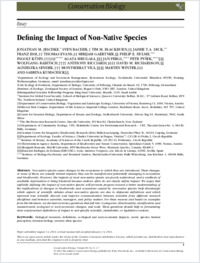Defining the Impact of Non-Native Species
- Jeschke, Jonathan M. Department of Ecology and Ecosystem Management, Restoration Ecology, Technische Universität München, Freising-Weihenstephan, Germany
- Bacher, Sven Unit Ecology & Evolution, Department of Biology, University of Fribourg, Switzerland
- Blackburn, Tim M. Institute of Zoology, Zoological Society of London, United Kingdom - Distinguished Scientist Fellowship Program, King Saud University, Riyadh, Saudi Arabia
- Dick, Jaimie T. A. Institute for Global Food Security, School of Biological Sciences, Queen's University Belfast, Northern Ireland, United Kingdom
- Essl, Franz Department of Conservation Biology, Vegetation and Landscape Ecology, University of Vienna, Austria
- Evans, Thomas Silwood Park Campus, Department of Life Sciences, Imperial College London, Ascot, Berkshire, United Kingdom
- Gaertner, Mirijam Centre for Invasion Biology, Department of Botany and Zoology, Stellenbosch University, Matieland, South Africa
- Hulme, Philip E. The Bio-Protection Research Centre, Lincoln University, Christchurch, New Zealand
- Kühn, Ingolf Department of Community Ecology, UFZ, Helmholtz Centre for Environmental Research – UFZ, Halle, Germany - German Centre for Integrative Biodiversity Research (iDiv) Halle-Jena-Leipzig, Leipzig, Germany - Institute of Biology/Geobotany and Botanical Garden, Martin-Luther-University Halle-Wittenberg, Germany
- MrugałA, Agata Department of Ecology, Faculty of Science, Charles University in Prague, Czech Republic
- Pergl, Jan Institute of Botany, Academy of Sciences of the Czech Republic, Průhonice, Czech Republic
- Pyšek, Petr Department of Ecology, Faculty of Science, Charles University in Prague, Czech Republic - Institute of Botany, Academy of Sciences of the Czech Republic, Průhonice, Czech Republic
- Rabitsch, Wolfgang Environment Agency Austria, Department of Biodiversity and Nature Conservation, Vienna, Austria
- Ricciardi, Anthony Redpath Museum, McGill University, Montreal, Quebec, Canada
- Richardson, David M. Centre for Invasion Biology, Department of Botany and Zoology, Stellenbosch University, Matieland, South Africa
- Sendek, Agnieszka Department of Community Ecology, UFZ, Helmholtz Centre for Environmental Research – UFZ, Halle, Germany
- Vilà, Montserrat Estación Biológica de Doñana (EBD-CSIC), Avda. Américo Vespucio, Sevilla, Spain
- Winter, Marten German Centre for Integrative Biodiversity Research (iDiv) Halle-Jena-Leipzig, Leipzig, Germany
- Kumschick, Sabrina Centre for Invasion Biology, Department of Botany and Zoology, Stellenbosch University, Matieland, South Africa
-
01.04.2014
Published in:
- Conservation Biology. - 2014, vol. 28, no. 5, p. 1188-1194
English
Non-native species cause changes in the ecosystems to which they are introduced. These changes, or some of them, are usually termed impacts; they can be manifold and potentially damaging to ecosystems and biodiversity. However, the impacts of most non-native species are poorly understood, and a synthesis of available information is being hindered because authors often do not clearly define impact. We argue that explicitly defining the impact of non-native species will promote progress toward a better understanding of the implications of changes to biodiversity and ecosystems caused by non-native species; help disentangle which aspects of scientific debates about non-native species are due to disparate definitions and which represent true scientific discord; and improve communication between scientists from different research disciplines and between scientists, managers, and policy makers. For these reasons and based on examples from the literature, we devised seven key questions that fall into 4 categories: directionality, classification and measurement, ecological or socio-economic changes, and scale. These questions should help in formulating clear and practical definitions of impact to suit specific scientific, stakeholder, or legislative contexts.
- Faculty
- Faculté des sciences et de médecine
- Department
- Département de Biologie
- Language
-
- English
- Classification
- Ecology and biodeversity
- License
- License undefined
- Identifiers
-
- RERO DOC 211335
- DOI 10.1111/cobi.12299
- Persistent URL
- https://folia.unifr.ch/unifr/documents/303685
Statistics
Document views: 120
File downloads:
- bac_din.pdf: 227
